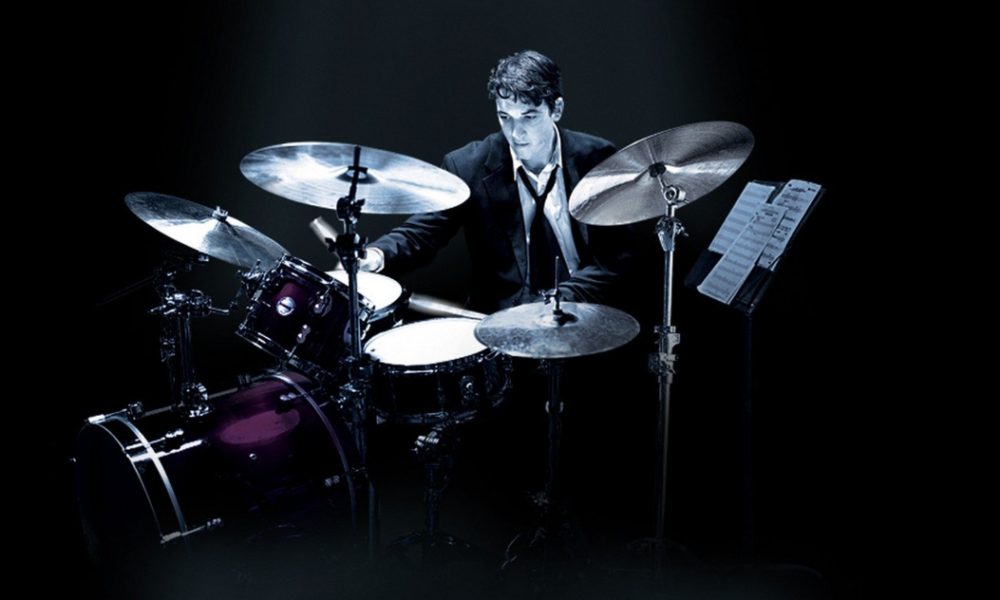
Whiplash
“I want to be great… one of the greats”.
C. N. Mathur
WRITTEN IN OUR HUMAN CODE IS AN INNATE DESIRE TO BE RECOGNISED; TO SUCCEED, whether that be through sporting success, academic accolades, social affirmation or through a multitude of endeavours. We all want to feel elite, at whatever we deem satisfying. This begs the question: what is our success worth, and what are we willing to undertake to achieve it?
As a diehard member of Mr Dorich’s Stage Band, and an ardent jazz lover, I was initially drawn to Damien Chazzelle’s Whiplash, as a means to relax, enjoy some music, perhaps also enjoy an uplifting story in the process. Within a few minutes of viewing I ditched the popcorn and strapped in for an intense, unforgettable, cinematic experience; left with a stinging, ‘woah, that’s deep’ feeling (that seems to happen a little too often). Since then it has remained one of my favourite films.
Whilst being full of subliminal social commentary, I’ll focus on the more apparent message of the film – what are we willing to do to achieve our goals, and to what extent are we willing to suffer for it (and for whom)?
The film, set in the fictional New York Schaffer Conservatory (based on Julliard), follows jazz drummer Andrew Neiman (Miles Teller), as he is driven to the edge by his tyrannical teacher, Terence Fletcher (J.K Simmons). Neiman’s desire to achieve perfection, in pursuit of Fletcher’s validation, spirals into obsession, threatening his sanity…
The film’s antagonistic band director, Terrence Fletcher, has become an underground Shore icon. With Fletcher epitomising the “success through suffering” narrative that seems to define how we approach our movement toward our goals – pouring our “blood, sweat and tears” in pursuit of success.
Fletcher’s declaration, “there are no two words in the English language more harmful than good job”, is emblematic of his mentorship – an autocratic coach who doesn’t positively affirm his students; instead he provides an emphatic shove to achieve one’s desired goals.
This kind of mentorship is a main driver for Neiman in the film, who seeks to gain affirmation from Fletcher. Neiman is tantalised with hope when Fletcher appears to acknowledge his potential, only to be torn down by his abusive methods of gaslighting and manipulation. Neiman’s continued suffering and pursuit of Fletcher’s validation is profound, and leads him to spiral into unhealthy obsession.
Within the film, justification for Fletcher’s abusive teaching methods comes down to his interpretation of a common jazz anecdote about the nature of Charlie Parker’s success.
Charlie Parker (aka Bird) was a visionary in the world of Jazz, regarded as one of the greatest jazz saxophonists of all time. A young Charlie Parker was attempting to play an improvised solo, but lost track of the chord changes; as a sign of contempt, Jo Jones threw a cymbal from his drum kit onto the floor at Parker’s feet to get him to leave the stage (Chazelle dramatises this – Jones threw a cymbal at his head, which parallels Fletcher’s infamous chair throw). This supposedly led a young Parker to train for famously gruelling sessions, all this leading him to become ‘one of the greats’.
Outward interpretations of this story sense the underlying tragedy. Whilst Parker became a legend he tragically died at 34, plagued with a crippling heroin addiction and anxiety.
The ending of the film creates an uncomfortable catharsis: It is a victory for Fletcher, who now gets the glory of creating his own Charlie Parker, yet the psychological torment for Neiman getting to this point may be devastating…
Ultimately, the ambiguous ending leads one to ponder the extent to which achieving greatness is central.
Whiplash has already established itself as a modern-masterpiece, with nominations for Best Picture 2015 and winning Best Supporting Actor for J.K Simmons. There is just so much to talk about with this film – I suspect I may write another article on it at some point!
